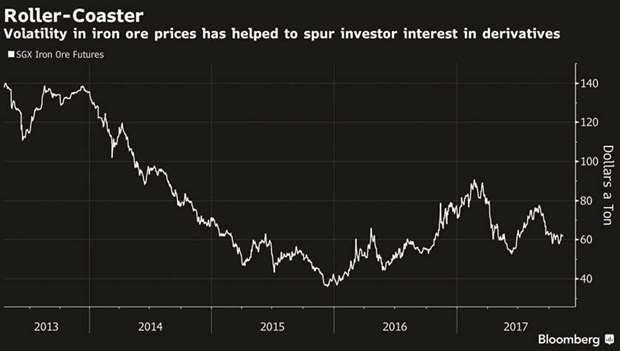Call it the iron ore wars. Two of Asia’s financial heavyweights are going head-to-head as Hong Kong Exchanges & Clearing starts futures for a commodity that’s seen extraordinary volatility and been a popular way to bet on China, challenging Singapore Exchange’s leading position.
HKEX began trading the futures last week, pitting the new dollar-denominated contract against those offered by SGX, which introduced its first swap contracts in 2009 and has become the world’s largest clearer of the derivatives.
To add firepower to the opening salvo, HKEX has promised newcomers all trading fees for the new product will be waived for six months.
Iron ore sits at the heart of the global economy, especially in largest user China, and the commodity has attracted growing investor interest in recent years. The derivatives are used by miners and mills for hedging, as well as traders and funds, and Goldman Sachs Group found in an 2016 study that it was SGX’s product that probably swayed the global market, rather than the more restricted offering on the mainland’s Dalian Commodity Exchange. Given the lead, the HKEX may find it a hard task to break out of its beachhead.
“They’re going up against a more established offshore contract in Singapore,” said Hui Heng Tan, an analyst at Marex Spectron. “It’s too early to gauge whether the new contract will gain much traction.
Some of that will depend on the terms they’re able to offer, such as trading fees and margins, as well as the liquidity of the contracts.”
The shakeup comes after the commodity’s been on wild ride. In 2013, spot ore fetched more than $100 a dry metric tonne.
By 2015 it fell below $40 as supplies swelled and investors expected China’s appetite to wane. This year, it’s gyrated between almost $95 and close to $50, and last was at $62.19, with China’s environmental clampdown in focus along with booming mine output. That’s been a boon for SGX, where trading of iron ore derivatives jumped 59% last year. Among other global exchanges, CME Group and Intercontinental Exchange also offer products tracking the raw material.
While HKEX has been building up its presence in metals – buying up the iconic London Metal Exchange – the new offering is its first ferrous product.
“HKEX believes this contract is going to be complementary,” a spokesman told Bloomberg. “With very active onshore iron ore futures on the Dalian Commodity Exchange and the heavy weighting of China in the trading of iron ore and iron ore derivatives, HKEX believes a transparent offshore iron ore futures will allow more efficient and timely price interaction among the markets.”
The Hong Kong contract will be settled in cash against The Steel Index price, which refers to ore with 62% content delivered to China.
Trading will run from 9am to 4:30pm before a second session from 5:15pm to 1am. The SGX product is priced against the same spot index, and trades from 7:25am to 8pm, with an overnight session that runs through 4:45am. Beyond trading hours, there are other differences.
Hong Kong’s new futures are mostly traded electronically, unlike the SGX AsiaClear contracts, where more than 85% of transactions are done over-the-counter, or OTC, according to the Singapore bourse.
“If you look at volumes on the SGX today, the majority of that is coming from the OTC community – meaning buyers and sellers who execute the transaction through the broking community,” William Chin, SGX head of commodities, said in an interview. “Brokers are extremely helpful when it comes to reaching out to clients in marketing the contract.”
Chin says while any exchange launch helps to improve visibility of existing products, it will be important for the new contract to create value, such as bringing new trading participants on board. “The ability to do that will be value-accretive, rather than looking at ways to shift the pie,” he said.

.
